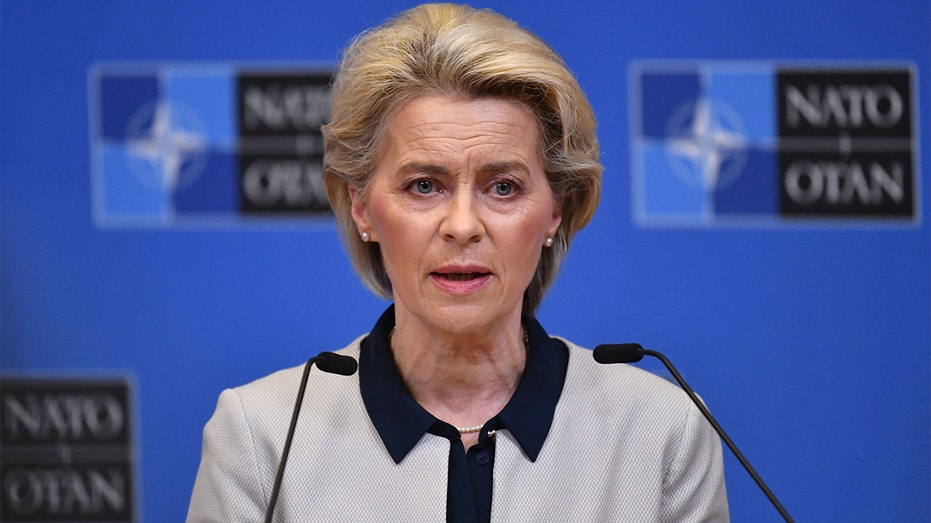Europeans increasingly burning trees for energy after green policies, Russian war, leave countries hobbled
FOX Business Flash top headlines for September 27
Check out what’s clicking on FoxBusiness.com
European consumers and businesses are increasingly turning to biomass energy sources, including wood-derived fuels for heating and cooling, as the energy crisis continues to wreak havoc across the continent.
The shift to biomass energy, which already accounts for the majority of renewable energy generated in the European Union (EU), has come as the Ukraine crisis disrupts energy supplies and alternate forms of energy production fall short, according to Bioenergy Europe, a leading industry group based in Belgium.
The group said Europe's biomass energy is largely sourced domestically while fossil fuels and green energy technologies are mainly imported.
Amid the crisis, Europeans have been forced to take drastic measures to conserve energy and keep bills low while governments have imposed rationing rules and introduced relief programs.
EXPERTS BLAME GREEN ENERGY POLICIES FOR EUROPE'S FULL-SCALE ENERGY CRISIS: 'A WARNING TO THE US'
Wind turbines stand at a wind park in Marsberg, Germany (AP Photo/Martin Meissner, File / AP Newsroom) "During this period of increasing uncertainty due to the war in Ukraine and the ongoing crisis which highlights the EU’s reliance on foreign fossil fuels, bioenergy stands as a clear counterpoint," Maija Lepistö, a spokesperson for Bioenergy Europe, told FOX Business. "Over 96% of the biomass used for bioenergy is being produced domestically within the EU and the rest coming from trusted streams." Prior to the current crisis, biomass energy accounted for 57.4% of total renewable energy production and nearly 12% of total energy consumed in the EU. Forestry products — such as logging residues, wood-processing residues, fuel wood and wood pellets — are the bloc's main source of biomass for energy, according to the EU's Joint Research Center. Lepistö said more consumers are turning to biomass energy thanks to it being a "local and affordable" alternative to traditional sources of energy. THE NETHERLANDS JOINS GERMANY, AUSTRIA, ITALY IN REVERTING TO COAL AMID RUSSIA'S INVASION OF UKRAINE "The current energy crisis in Europe has not placed the supply of biomass raw material at risk," she told FOX Business. "Unlike fossil fuels with their high import rates and other renewables supplying their technology from outside the EU, biomass has the benefit of being locally sourced, produced and dispatched as well as supply of the necessary equipment." "Just as with other markets, the ongoing war is affecting the bioenergy sector," she added. "However, the EU’s internal market can continue supplying bioenergy to the end users, and more businesses and citizens are turning to this renewable, local and affordable solution, which has more potential to grow and (reinforce) the EU’s green goals." European Commission President Ursula von der Leyen gives a press conference on Russia’s military operation in Ukraine after talks with the president of the European Council and the NATO secretary general at NATO headquarters in Brussels Feb. 24, 2022 (John Thys/AFP via Getty Images / Getty Images) In 2021, the EU consumed a whopping 23.1 million metric tons (MMT) of wood pellets, a year-over-year increase that can be attributed to increased German residential use and an uptick of co-firing of wood with coal in power plants in the Netherlands, according to a U.S. Department of Agriculture (USDA) report. The report said demand in 2022 is projected to increase by another 1.2 MMT in 2022 due to even greater expansion in residential markets and increasing prices of fossil fuels. GAS LEAK IN NORD STREAM PIPELINES LIKELY CAUSED BY SABOTAGE, GERMANY SAYS Overall, the vast majority of biomass energy power generation in the EU is generated by the industrial sector at combined heat and power plants, Lepistö added. The remainder produces electricity and transportation fuels. "Thanks to its versatility, biomass is also used in most of the other energy-intensive sectors to provide heat for industrial processes," she said. The global energy market has been destabilized in the aftermath of Russia's invasion of Ukraine in February as the U.S., EU and allies have aimed to cut off Russian fossil fuels and products. The crisis has acutely impacted Europe to the point consumers and businesses rely heavily on Russian natural gas for electricity and petroleum for transportation. Fox News contributor and investment adviser Gary Kaltbaum says the European Union needs to address oil disruptions from Russia and the continent’s natural gas consumption needs. At the same time, experts have blamed Europe's climate agenda and aggressive push to replace fossil fuels with green energy sources like wind and solar for exacerbating the crisis. CLICK HERE TO READ MORE ON FOX BUSINESS "There's been under-investment in fossil fuels in Europe," Fabian Rønningen, a senior power markets analyst at the Norwegian research firm Rystad Energy, previously told FOX Business. "There has been all these closures of coal power plants. "If you have a system with a lot of solar and wind, you need some backup in the system. Until we find a better technical solution than natural gas, you need something to back it up, and that is the role of coal and gas and also nuclear in Europe at the moment." Source: Read Full Article
No matter what, Europe’s energy crisis ‘ends up pretty bad’: Gary Kaltbaum


